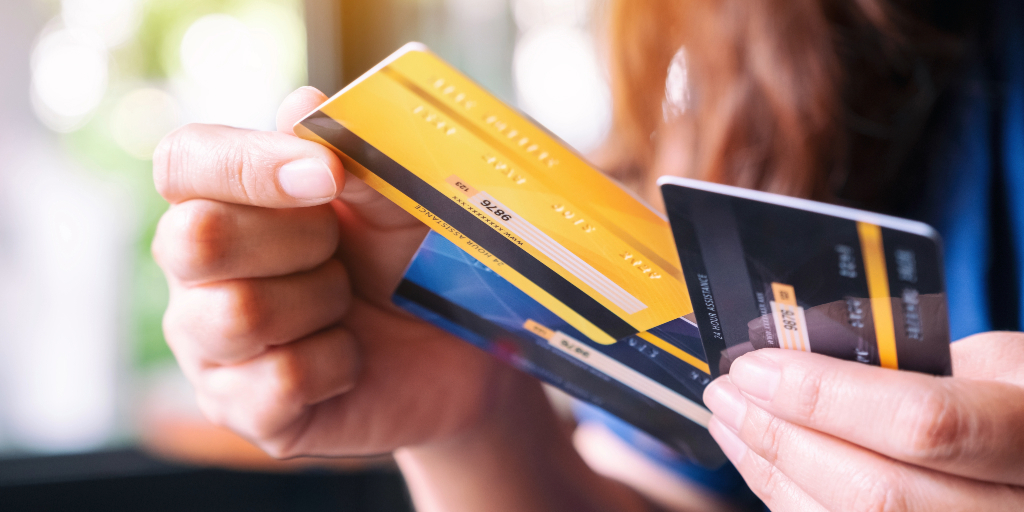When Should You Use a Debit Card vs. a Credit Card?
Minute Read

(Edited by Shauna Scarnato)
Gas, groceries or your next online buy—should you reach for a credit card or a debit card? While the two may look alike, they function very differently. Let’s break down how each one works and the unique perks they bring to the table.
The Benefits of Having Both a Debit Card and a Credit Card
Credit cards offer stronger fraud protection, especially when shopping online, and help build credit—just be sure to pay them off monthly to avoid interest charges. Debit cards pull directly from your bank account, making them ideal for smaller purchases or sticking to a budget.
Use a credit card to build credit and earn perks; use a debit card to manage everyday spending.
When to Use a Debit Card
The answer is—anytime you'd rather use your own money, whether you physically withdraw cash or use the plastic card linked to your checking or savings account.
Most debit card transactions happen instantly, but if you pick the credit option at checkout, the payment goes through a different process and may not come out of your account right away. Use this when you don’t want to enter your PIN and are confident there will be sufficient funds in your account.
Here are examples of when to swipe a debit card:
You Need Cash
You can use your debit or credit card to withdraw money from an ATM, but there are generally fewer fees with a debit card. If you use an in-network ATM, the transaction is typically free or carries a minimal charge. If you use an out-of-network ATM, charges will likely be applicable.
For Cash-Only and Small Transactions
Some merchants—especially small businesses—prefer cash or debit to avoid credit card processing fees. Credit transactions can take days to settle and come with the risk of chargebacks due to customer disputes, which can hurt a business’s cash flow.
You Are Paying Off Debt
If you are carrying a balance month-to-month, it’s smart to pause credit card use and switch to your debit card. Relying on credit while trying to pay down debt can lead to a never-ending cycle, making it harder to get ahead financially.
To Manage Spending and Avoid Carrying a Balance
If you need to use your credit card to purchase something you otherwise could not afford with your debit card, it is better to save up and use your debit card or have a payment plan. Otherwise, you could end up paying far more for a product or service due to interest.
When to Use a Credit Card
Credit cards offer convenience and security and help you establish a strong credit record if you use them wisely and practice good financial habits. Another perk of using credit cards is that many issue cash back, points and discounts as rewards for purchasing certain items or services.
Consider using a credit card in the following situations:
To Make Online Shopping Payments
While credit card fraud can happen, reporting it quickly typically protects you from being held responsible. Many credit cards offer zero liability protection which protects against charges made using your credit card number without your authorization. Debit cards offer similar protections. However, if someone gets access to your debit card information and cleans out your checking account, the balance disappears, and you could experience delays in accessing your funds.
With a credit card, your funds remain secure, and all you need to do is report the fraudulent transaction(s) to your credit union.
For Recurring Payments and Everyday Purchases
Smaller recurring payments like subscriptions to gyms, clubs and streaming services come with monthly fees that you can place on your credit card instead of your debit card. These recurring payments keep your line of credit open and may help increase your credit score without much effort.
You can use your credit card for some everyday purchases to help improve your credit score, as long as you effectively manage the balance (ideally paying off the balance in full each month). Staying within the recommended credit usage is vital, as carrying a high balance adversely affects your credit score.
You Want to Take Advantage of a Promotional Rate
Many credit cards offer an introductory 0% Annual Percentage Rate (APR), meaning you won’t pay interest for a set period, or a special balance transfer rate that allows you to move higher-interest debt to the card for a lower rate. These can be great options if you want to make a large purchase and pay it off over time or if you're consolidating existing debt to avoid high interest. However, be mindful of when the promotional period ends and aim to pay off the balance before the regular APR kicks in.
Get the Most from Your Members 1st Visa® Cards
Understanding the benefits of a Members 1st Visa credit card and a Members 1st Visa debit card can help you better manage your money and improve your financial habits. Whether you value the convenience and rewards that come with a credit card or the direct access and control of a debit card, having both lets you enjoy the best of both worlds.
